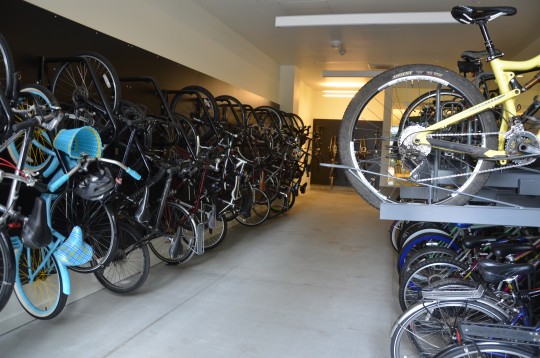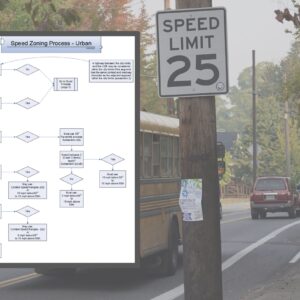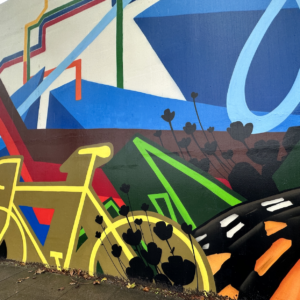It’s hard to say yet whether living in Velomor is leading people to bike more. But the people who’ve moved in certainly own a lot of bikes.
Bike parking for the 177-unit Lloyd District building that opened in July is already full and overflowing, and the apartment managers have set up two overflow racks in the still-vacant first-floor retail space that faces Holladay Street. Residents access the overflow racks by asking a concierge to let them in.
Velomor, the first of three buildings to open at Hassalo on Eighth, is currently about 80 percent occupied but almost entirely leased up for next month, a concierge said Thursday.
In one sense, of course, lots of bikes is great news. But they may also represent a challenge for Hassalo on Eighth, the big Lloyd District development that has only been able to find room for more than 1,200 bikes by making some of its bike parking areas much more convenient than others.
Here’s the problem: What do you do when a bunch of the bikes that fill a building’s bike parking spaces are rarely getting used?
Advertisement
Velomor’s free and extremely convenient street-level bike parking area was far more than half full on Thursday afternoon, a dry fall day that could hardly have been better for bike commuting.
Which raises the question: If there are any frequent bike users among the remaining 20 percent of residents — probably about 50 people — where will they park their bikes?
What about current residents who, after living a few months in the Lloyd, might decide to get a bike and start using it regularly?
Hassalo on Eighth is planning to open a huge, equally free underground bike parking area, complete with valet service. But it’s located in the basement garage of the building across the plaza from Velomor, and the bike valet isn’t expected to remain open into late evening.
The problem of first-rate bike parking filling up with little-used bikes isn’t unique to Hassalo on Eighth, of course. We’ve written several times about other apartments with similar issues, and wondered whether more apartment buildings should nudge occasional users toward the less-convenient spaces by charging several dollars a month for access to the best bike parking.
Hassalo on Eighth spokeswoman Leslie Carlson said Thursday that the landlords are working hard to promote bike use among their tenants by planning to give free rent to Go Lloyd for a “Bike Hub” in one of the development’s street-level storefronts and including information about transportation options with every move-in packet. She added that even the most annoying bike parking scenario — walking across the plaza and into the basement of the Lloyd 700 office building to fetch a bike after valet hours — is probably less annoying than parking a car.
As for helping make sure that people who rarely use their bikes don’t take up a large share of the best bike parking spaces, Hassalo managers continue to say the same thing they’ve been saying for more than a year: that they’ll be able to solve the problem by politely asking some bike owners to stop using the most convenient spaces.
So far, the concierge said, the plan is working in at least one way: the people whose bikes are stored in the less convenient parking area very rarely seem to use their bikes.
— The Real Estate Beat is a regular column. You can sign up to get an email of Real Estate Beat posts (and nothing else) here, or read past installments here.









Thanks for reading.
BikePortland has served this community with independent community journalism since 2005. We rely on subscriptions from readers like you to survive. Your financial support is vital in keeping this valuable resource alive and well.
Please subscribe today to strengthen and expand our work.
My office is meant to move to the 700 Lloyd building next year with a couple hundred employees that have a 8% ridership rate. Makes me worry about the realities of the promise of bike parking that are being offered.
I’m currently working (construction) on a job in the Lloyd, you don’t by chance work for a medical facility/company? I just found out who the future occupant of my project is and it’s bringing in about 350 employees (and your description seems to jive with what I know).
Never mind, missed that you named the building (been that kind of day).
Heh – congrats on the Bike Commute Challenge. Our respective employers collaborate on a few things here and there. I’ve been to those offices to meet with your colleagues that have already re-located. You might like working in that building – the conference rooms have Mondo-pads!
Seriously though, there’s a lot of staples at the entrance to that building, and the presence of auto valets make it a secure place – although you guys moving in might overwhelm the available bike parking.
Suppose you own five bikes. Can you park them all, indefinitely and for free, at Velomor? How about ten?
Free resources always get abused.
They should consider a system where bikes (or their locks) have to be annually stickered, and each tenant gets a couple of stickers free but has to pay a significant sum for additional stickers.
I was wondering that too.
What if by proving you don’t own a car you could qualify for preferential bike parking?
Of course charging a nominal fee for the bike parking, or a much more than nominal rate for the second, third, fourth, spots could also go a long way toward solving this.
In planning that scenario is called “the tragedy of the commons” after a famous 1833 article about overgrazing.
https://en.wikipedia.org/wiki/Tragedy_of_the_commons
Hardin’s article, though a hit, was based on a crucial misunderstanding of the historical concept of the commons related to how or to what extent it was actually carefully managed, rather than the free-for-all Hardin mistakenly assumed. Hardin concede years in a letter to the editor that he should have said ‘Tragedy of the Unmanaged Commons.
Common pool resource theory high five!
Also see The High Cost of Free Parking (https://en.wikipedia.org/wiki/Donald_Shoup). Not sure bikes are likely to create the kind of planning disaster that requiring free parking for cars does, but putting a price on services does cut down on piggishness and abuse.
mh
I think they are actually using a sticker system, but I’m not sure. They’re not using a price system (edit: not for the first sticker) but they might be using a quota.
Yes you’re correct. A sticker is required.
If you own 5 bikes (2 seems much more likely), is parking them in your building’s bike parking really abuse? And does anyone buy another bike just because they’ve got a free place to park it?
I do think management can periodically leave notes on the long-term parked bikes asking the owners to move them into the less convenient storage. But really… more bike parking.
I live at Velomor and you can park one bike free. Each additional is $25.
Is that $25 per year?. Or permanently?. Are the stickers re-issued every year?
Per month.
Agree. I have 5 bicycles, 1 gets daily use, another weekly, a third, occasionally, 1 only during cross season and a 5th hardly ever. I have a garage at my house, but were there costs involved in storing them, i would be very motivated to trim down the fleet.
Clearly they need more bike parking (especially at a building called “Velomor”). The building code should require it. Every time you see a bike on an apartment balcony, it means there was a failure somewhere.
It’s not a flaw in the code. The city gave some leeway to this project and let it count the spaces in the not-yet-opened underground garage toward the 1.5 spaces per unit that were required for Velomor. (See the link below in my comment to Todd.) If you ask me, that’s reasonable … as long as Hassalo is taking steps to make bike parking comparably easy to use. The street-level valet and Go Lloyd storefront will go a long way toward that! But part of making something convenient might also be making sure the primo spaces get in the right hands.
Ah, ok… there are more spots coming. I missed that in the article.
Michael – would you update this article with a reminder for us on the number of long term bike spaces for these 177 units in this room (minimum code vs. the actual built)? I assume they built more than required.
In our [Bikestation] work with the Capstone Partners projects (Grant Park Village and Block 296 etc.) their goal was to surpass the City’s minimum bike parking ratio (1:1.1) required for the zones the buildings were in by over 20% (my memory) in order to avoid the problem you write about.
I think there are 61 stalls, based on this diagram, but it isn’t current.
That seems REALLY low for a building that is essentially marketing to people with bikes.
I shall now coin the planning terms for bike parking, as
– the “Room to Rack Ratio” and
– the “Residence to Rack Ratio”.
Now go forth to use them and embrace them with my blessing.
The best method would probably one where they were somehow able to track how often bikes were accessed that granted the most convienence to those bikes used the most often. This would also represent a cost savings if the less convienent parking involves paying a valet…
If bike parking ends up over-utilized relative to car parking, I suppose they could always convert a few car spots, right?
I’m totally confused by this article. I’ve read it twice, and I still can’t figure out what it’s about. There are lots of bikes locked up. There are not enough bikes locked up. What? Can somebody explain to somebody with not enough brain cells like me, exactly what this article is trying to convey? Thankyou!
not complicated. bike parking’s basically full, but there are still more people expected to move in who also might have bikes/want to park them.
My fault not yours, Adam. I’ll try to make some tweaks to phrase things better.
The basic problem here is that the primo bike parking space is probably filling up with a lot of bikes that are rarely getting used.
Ah, got it! That makes more sense!
The managers and concierge staff are phenomenal here. They are trying to encourage people to move their bikes to the overflow but it’s difficult to know who uses their bikes often. I ride daily and rarely see the other bikes in the main storage area used.
If there is a pump immediately available, the best way to see when a bike first moves is to let the air out of a tire. I haven’t actually done it, but have used the long term uninflation to get abandoned bikes tagged and possibly removed.
mh
Simpler & less like vandalism is to note the position of the valve stems. There is a very slim chance both of them will end up in the exact same position after a ride.
Similar to how they mark abandoned vehicles (more than 3 days without moving) is chalking the tire. They chalk the wall of the tire and the ground where it is, assuming that someone driving would rarely 1) park in exactly the same spot, and 2) have the wheel line up perfectly.
My work goes through this with bikes in the fall after all the summer riders have stopped commuting by bike. Last year there were 5-10 bikes left, which were marked with a note saying they would be donated to charity if left unclaimed. This year I’ve only seen two bikes in the same area that have not been moved for awhile.
One possible problem would have to do with expectation. If I had parked a bike there with the expectation that it could be parked long term, then having it towed away while going about my normal business that may have not included biking for a couple weeks would be wrong. If the management sets up the expectation that premium spots are for commuting and there is a way to notify the owner, (I hear they are using stickers, but have not heard if these are serialized/unique to the owner or just a standard sticker for the building), then they could track them and give notification. They could also go based off complaints from others who have seen the bike never move, much like the parking on the streets of vehicles for days on end is mostly policed by residents who call in to code enforcement.
I’m all for bike parking in secured locations but some places in Portland do it better than others. I keep all my bikes in my apt. It’s worked out where all 4 fit. Would I ever leave one of them locked up in secured parking at my building now, probably but then again, it’s easier to just roll it out my front door.
Or converted to people housing (pre1940 garages with level floors) or bike parking.
Today’s car parking woes will be tomorrow’s bike parking woes especially when inner city parking garages are torn down for better use.
I wonder if Go Lloyd will add more single-bike lockers. They fit 32 of them in the same space as ~5 car spots.
Perhaps this could be solved with a ‘purge’ model, where once a quarter bike parking is opened up to campers/travelers to come in and take what they can with bolt cutters and magical u-lock defeat devices. Attentive bike owners will clear out, and only the disorganized and lazy lose their bikes.
In our building in the NW the bike room was always full too. The problem; it turned out that people were mainly storing their recreational bikes there, often being unused for months. The solution; was to require a modest annual fee for use of the bike room. The result; was that people who rode their bikes infrequently moved their bikes out which opened up space for daily riders, which is what the room is intended for. The lesson; never underestimate the ability of people to misuse well designed facilities!
Is that really “misuse” though. They were simply storing bikes in a bike storage room.
Long-term bike storage, being no different from long-term furniture or mower or junk storage, doesn’t need to be done in a bike storage space. So while not misuse, it is not the best use.
In our apartment my partner and I store 12 bikes. 4 in a rather large closet hanging by wheels ,(alternating handle bars) two in a floor to ceiling rack system in the bedroom, three to be more artfully displayed on an inch wide shelf with some molding and a single chain and hook from above located in open, high, wall space and two to live leaning against the couch. We have what we call the great bike rotation twice a year. The commuters of course never leave the couch. 😉 Anyways, this is all because our apartment only offers a cluster f* of squished in, barely secure bike parking in a large shared 10 car garage for free. He just tried to clean out the abandoned bikes which turned out to be about 50% or 20 bikes were left by previous tenants.
Oh man, they would hate me…. I have four bikes that I actively ride.
Pretty sure I ride my #6 bike more often than the average person rides their only bike.
I’ve looked in that window many times! There’s not a single space that accommodates a cargo bike.
Sounds like a good location for a bike share station to reduce the number of bikes someone might need to own. Or maybe the bike hub will have its own version.
They could track the bike use in the same way many municipalities track car parking limits – chalk. What happens is a meter maid comes by and puts a line of chalk on every tire on the street. When they come by 2 hours later, any car with chalk has overstayed the 2 hour limit and gets a ticket.
Put a chalk line on each bike on Monday. Come back next Monday. If the chalk line is still there, in the same place, the bike was not used. They can then have a conversation with the owner and ask them to move to a less prime spot.
I like this idea a lot better than the previously proposed idea of deflating my tires.
Build that bike/pedestrian over 84 connecting 7th and 8th already, and the residents bikes will become more useful.
Bike parking: successful in buildings where $1500/mo. buys you 500 square feet! Hail corporate.
Living just to the north in western 97212, our more spacious apartment has dedicated, private, covered bike parking inside a Rubbermaid shed on the balcony. It cost less than the differential of just one month’s rent.
Once again: what problems are amenity-rich new apartments really solving?
“what problems are amenity-rich new apartments really solving?”
…rescuing bicycling from being viewed as the way poor people get around.
How many bikes can Velomar currently accommodate?
Are people allowed to bring bikes in apartments?
Reading this I had a daydream about a store-front franchise that offered secured bike parking. They catered both to residents as a kind of “home base” and to shoppers/commuters using it for storage during trips. It helped address bike theft, and it solved a problem for homeowners without garages who didn’t want to drag a bike inside.
Does smart park offer valet bike parking ?
After thinking this over, seems the solution is to charge for the convenient parking and keep the inconvenient parking free. That way those who simply own a good intention bike will leave space for those that have a commuter bike.